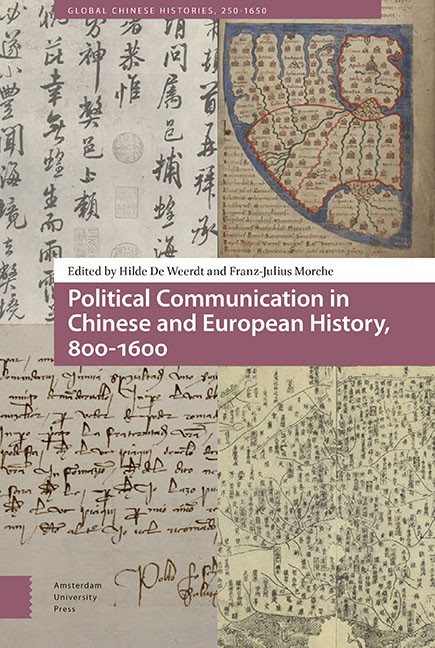Book contents
- Frontmatter
- Dedication
- Contents
- List of Figures and Tables by Chapter
- Acknowledgments
- Introduction
- Part I Communication and the Formation of Polities
- Part II Letters and Political Languages
- Part III Communication and Political Authority
- Part IV Memory and Political Imaginaries
- Epilogues
- List of Contributors
- Index
2.1 - Fragmentation and Financial Recentralization: The Emergence of the Four General Commands (1127-1165)
Published online by Cambridge University Press: 17 June 2021
- Frontmatter
- Dedication
- Contents
- List of Figures and Tables by Chapter
- Acknowledgments
- Introduction
- Part I Communication and the Formation of Polities
- Part II Letters and Political Languages
- Part III Communication and Political Authority
- Part IV Memory and Political Imaginaries
- Epilogues
- List of Contributors
- Index
Summary
Abstract
In creating four General commands (zonglingsuo) between 1141 and 1145, at the end of the first Song-Jin war, the central government of the Song Empire hoped to marshal resources from the four areas along the new border while also controlling the military officials in charge of the armies. With the fragmentation of the monetary system, this financial organization resulted in a real autonomy of these strategic areas. Eventually, this reform induced the fragmentation of the fiscal and financial authority and, as accounting procedures became more complex, generated a new kind of technical communication between the regional and the central administrations. Lastly, it allowed high-ranking civil servants involved in this process to reinforce their institutional positions.
Keywords: general commands (zonglingsuo), Song-Jin war, fiscal authority, monetary system
This study explores events that resulted in the recentralization of fiscal administration in Song China (960–1279) from the vantage point of the institutional dislocation emphasized in the sources. In 1141, thus even before the 1142 peace treaty between the Song and the Jin Empires temporarily ended the war that had begun in 1125, three General Commands (zonglingsuo) were established in the Lower and Middle Yangzi areas, and a similar administration was also created in Sichuan in 1145. The goal of the Song court was to draw more resources from those four strategic regions and also to enforce its control on the generals in charge of defence. This new fiscal and financial organization, grounded in the fragmented monetary system and the territorial consequences of the war, led to an increased technical complexity of fiscal and financial procedures, and hence to changes in the form and content of accounting procedures between the central administrations and the offices that managed regional and local affairs.
The wars the Song Dynasty fought for its survival against the Jin Empire are not simply taken as an historical context. The sources indeed suggest that the restoration of its dynastic power, which had lost all of Northern China, occurred through a series of hastily improvised decisions in reaction to the dysfunctional relationship between civil officials and increasingly autonomous military commanders. We shall attempt to reconstruct one of these processes by studying the circulation of quantitative data.
- Type
- Chapter
- Information
- Publisher: Amsterdam University PressPrint publication year: 2021

